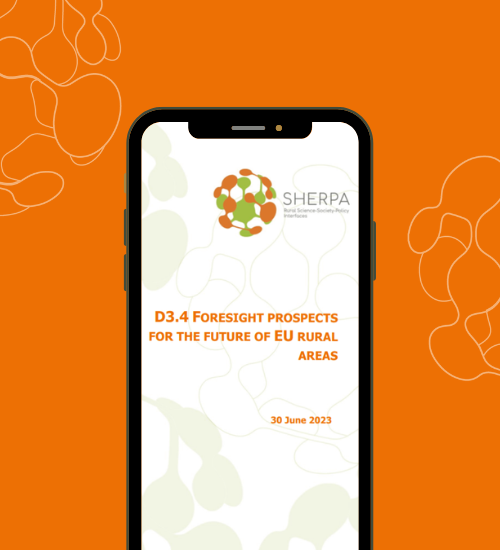
SHERPA just published a new SHERPA report “Foresight prospects for the future of EU rural areas”. Offering a systematic overview of existing foresight studies, the report identifies some drivers of change and plausible scenarios that will be instrumental in defining the trajectory of rural areas within the European Union. The report was prepared by the University of Pisa, CIHEAM Montpellier, James Hutton Institute, and Ecorys.
Significantly, the report serves as an extensive update of another SHERPA report titled “Overview of a sample of existing foresight and scenario studies carried out at EU and global levels” (2020), encompassing foresight studies conducted between 2009 and 2019. In addition to the results of the report published in 2020, this latest version integrates two important elements, namely the COVID-19 outbreak, with related crises and impacts, and the centrality of foresight as a policy instrument during the current European Commission mandate.
A few highlights from this SHERPA report are outlined here below:
- Rural areas are diverse and have specific needs: The report emphasises understanding and addressing the specificities of rural areas, such as ageing populations and economic disparities compared to urban regions.
- Rural diversity reflects opportunities and constraints: the report stresses the importance of preserving and enhancing the assets of rural areas, based on their unique natural, social and cultural capital of rural areas,.
- Rural-urban connections are crucial for thriving communities: recognising the value of the services that rural areas provide to urban centres is vital. By improving the quality of life in rural regions through adequate infrastructure and services, they can attract new residents.
- Foresight scenarios are valuable for forward-looking policies: foresight exercises and scenarios help decision-makers anticipate possible changes and implications. Addressing challenges related to climate change, ecological collapse, food security and digital exclusion requires preparing for different future scenarios.
- Interconnected drivers and systemic approaches should be carefully considered: Taking a systemic approach to analysing drivers and preventing multiple potential crises is crucial to promote systemic measures.
Do not to miss this invaluable report.
Access it here!
Published by Maite Iglesias